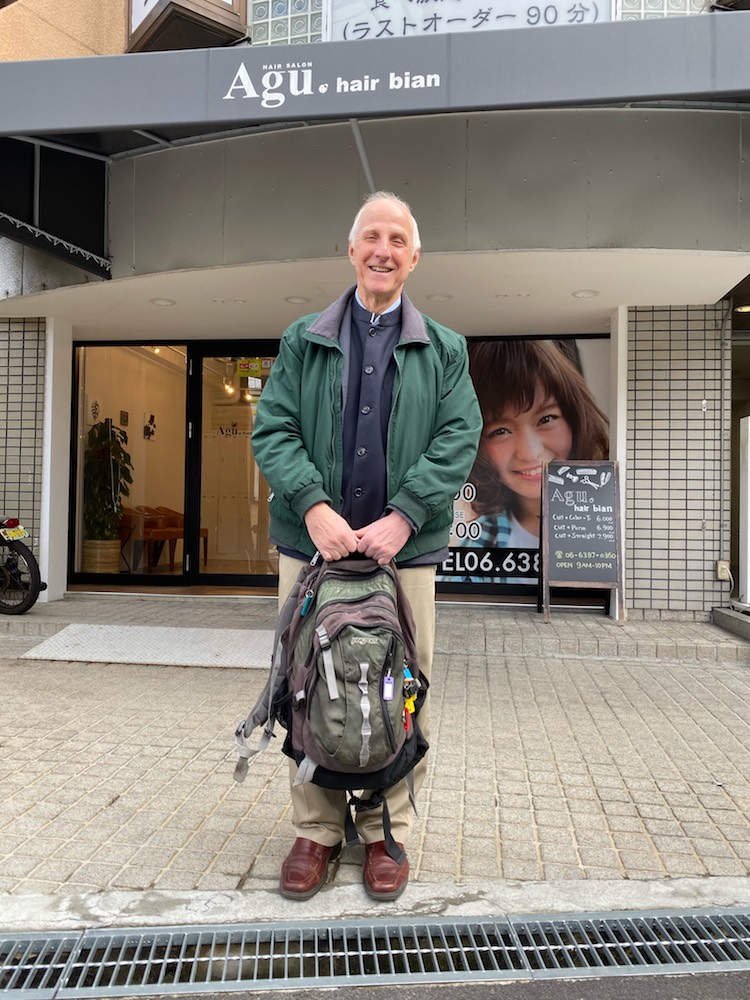Agu hair bian
« previous post | next post »
Here I am standing in front of a hair salon near the south gate of Kansai University in Osaka, Japan two days ago:
I had just gotten off the train from the center of Osaka and was walking to the Kansai University south gate with half a dozen Japanese and Chinese colleagues when we came upon this hair salon. As soon as I saw the sign on the awning, my feet were rooted to that spot.
What in the world does that "bian" mean? None of my colleagues had a clue.
It looked like Hanyu Pinyin "bian", which might mean "convenient", "braid", "transform", etc., but what would Hanyu Pinyin be doing in an English name of a Japanese hair salon?
Being the inquisitive soul that I am, I went into the shop and asked the people who worked there what "bian" meant, and they didn't have any idea either!
Then the group went up the gentle slope to have lunch in a cafe on campus. Several other colleagues joined our party, which by then included a total of around ten people. The last to arrive was Takata Tokio, professor emeritus of Kyoto University. The subject of the name of the hair salon came up again, and everyone professed ignorance, except Prof. Takata, who right away said that he thought it was being used as a stand-in for French "bien" ("well; good"). His reasoning was as follows:
1. The Japanese katakana transliteration of French "bien" is "ビアン".
2. If we transliterate katakana "ビアン" into Japanese Rōmaji, we get "bian".
3. This Rōmaji "bian" only superficially resembles Pinyin "bian", but they are pronounced rather differently, viz., [bʲaɴ] vs. [piɛn].
Such are the vagaries that happen when a word passes from one language to another and yet another….
[Thanks to Yukiko Gen]

Jim Breen said,
December 2, 2019 @ 3:21 am
The use of ビアン (from the French "bien") seems to be largely confined to the names of hair salons and beauty parlours.
The more usual use of ビアン in Japanese is as an abbreviation of レスビアン, i.e. "lesbian". This is how it appears in several dictionaries, including the major 大辞林 published by Sanseido:
ビアン
〔レスビアン(lesbian)の略〕
女性同性愛者の俗称。
Jim
Jim Breen said,
December 2, 2019 @ 4:12 am
It seems ビアン/Bien also occurs in rstaurant names.
BZ said,
December 2, 2019 @ 3:13 pm
I'd be just as surprised to find a French word in an English name (or is it vice versa) of a Japanese restaurant as I wood a Chinese/pinyin one.
BZ said,
December 2, 2019 @ 3:14 pm
Sorry, hair salon
便者民 え。折察知 said,
December 4, 2019 @ 10:14 am
Question about the topmost phrase in the picture — "ラストオーダー90分" ("last appointment must be made 90 minutes prior to closing."?)
Does that relate to the hair salon? If so, do the Japanese use "オーダー:order" to refer to hair appointments. I'm guessing it refers to a restaurant on the second floor, because I think I can see a "食" (ta/shoku:eat) poking out just above it.
If it does refer to the restaurant, why use the borrowed English term, rather than, say, "最終注文" (saishū chūmon:last order)?
It seems like it's unpopular (for reasons not readily apparent to me) to advocate for usage of "native" words over "borrowed" words, but, geez, does anyone really want to see the Japanese language become a "creole", gutted of its native wordhoard? I find myself thinking, every time I see a superabundance of katakana where there exist perfectly serviceable "Japanese" terms, that the language's ability to slice up reality in interesting, even poetic, ways has been lost somewhat.